
book
「硬地骇客 - 两个月 $12000 ARR 实践之路」是由 硬地骇客 团队编著,本书是关于 Podwise 产品历程的忠实记录:内容包含 灵感 - 构建 - 发布 - 增长 - 复盘 五个章节。如果你觉得一个人读不够过瘾,欢迎加入「硬地骇客」官方知识星球与专家们一起讨论!Podwise 的故事才刚刚开始,我们也将在星球持续分享我们的认知,成功可能无法复制,但失败一定可以借鉴。现在就点击下方链接加入吧!
Stars: 1049
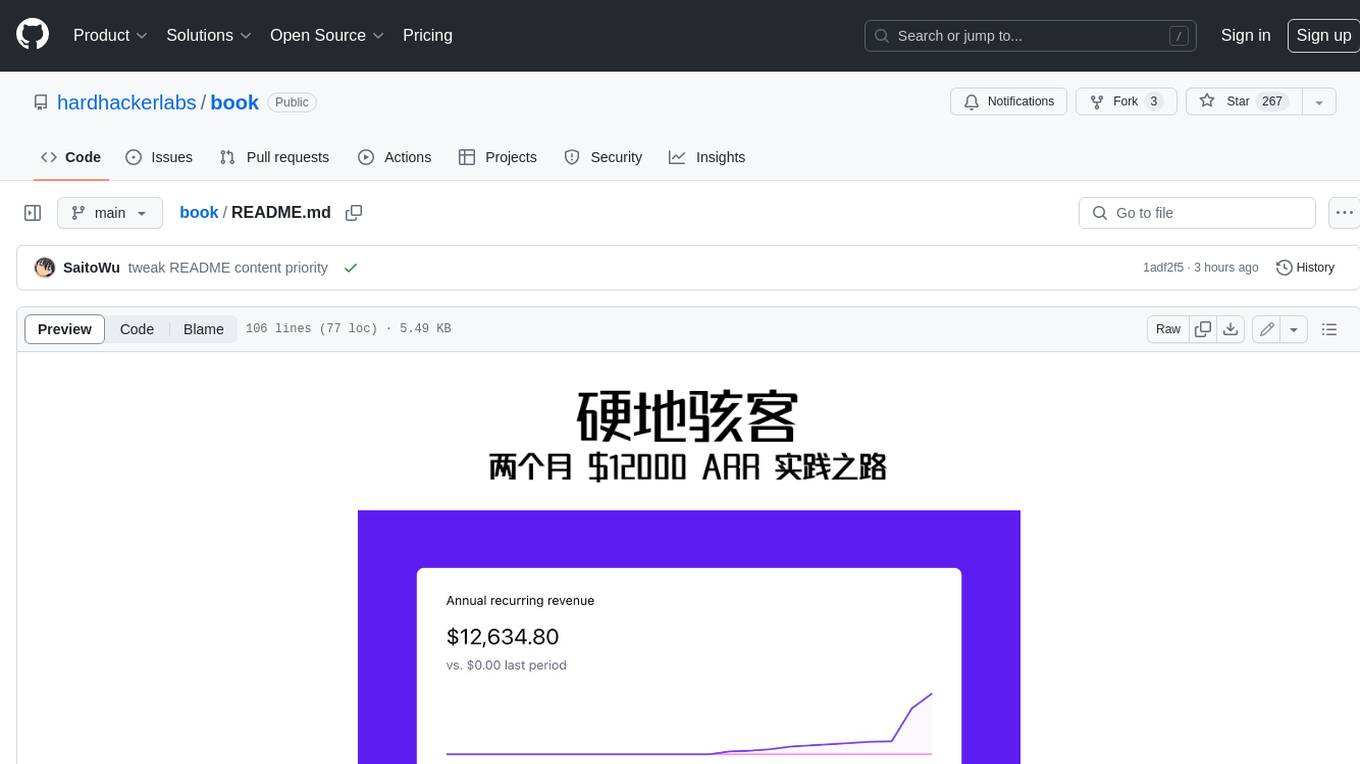
Podwise is an AI knowledge management app designed specifically for podcast listeners. With the Podwise platform, you only need to follow your favorite podcasts, such as "Hardcore Hackers". When a program is released, Podwise will use AI to transcribe, extract, summarize, and analyze the podcast content, helping you to break down the hard-core podcast knowledge. At the same time, it is connected to platforms such as Notion, Obsidian, Logseq, and Readwise, embedded in your knowledge management workflow, and integrated with content from other channels including news, newsletters, and blogs, helping you to improve your second brain 🧠.
README:
欢迎大家加入「硬地骇客」的官方星球并参与本书的讨论。
社群提供如下服务:
- 全年不少于 24 篇专题分享,内容包括但不限于 灵感 - 构建 - 发布 - 增长 等产品关键环节。
- 全年 50 期左右的「硬地骇客」播客文章版内容以及参考资料,通过文章的阅读体验可以在收听节目之后方便快速检索播客内容。
- 为支持社群会员的产品发展,社群为每位会员提供「硬地骇客」播客节目 Show Notes 广告位一次,价值 ¥500,可为产品提供高质量的站点外链,提升搜索引擎排名。
- 不定期的黑客马拉松赛事,优胜者可以获得包含现金奖励与项目孵化等合作项目支持。
关注前沿科技,分享创业故事,打造 “超级个体”,寻找利基市场,构建小而美的生意,同时也希望和广大 Hacker 一起探讨技术、产品和商业之美。
本书是关于 Podwise 产品从灵感到变现过程的忠实记录以及复盘。
Podwise 是一款专为播客听友设计的 AI 知识管理应用。 利用 Podwise 平台,你只需 follow 喜欢的播客,比如「硬地骇客」,当有节目发布后,Podwise 会通过 AI 对播客内容进行 转录、提取、总结、分析 等一系列操作,帮你掰开了揉碎了硬核的播客知识。同时与 Notion、Obsidian、Logseq 和 Readwise 等平台的打通,嵌入你的知识管理工作流,协同在其他渠道的包括新闻,Newsletter,Blog 等内容,帮你完善第二大脑 🧠。
Podwise 今天的成绩远称不上成功,可能勉强算是找到 PMF (Product-Market Fit),所以这不是一份权威指南,内容仅供参考。
全书以产品的全生命周期划分为 5 个部分:
💡 灵感
🚀 发布
💸 增长
本书的作者是「硬地骇客」社区,硬地骇客即 Indie Hacker 的意译。
硬地骇客社区核心成员由三位拥有10年+互联网创业者组成,我们关注前沿科技,分享创业故事,打造 “超级个体”,寻找利基市场,构建小而美的生意,同时也希望和广大 Hacker 一起探讨技术、产品和商业之美。我们正在努力探索一条能够同时实现财务、时间和身体自由的道路,希望能够通过 Podcast 将我们的故事分享给大家。
硬地骇客是一群追求自由充实的生活并喜欢挑战的 Builder,热爱技术,构建产品,崇尚依靠产品驱动的增长方式构建出自己的小生意。 如果你也喜欢这些信条,欢迎加入我们硬地骇客社区。
我们坚信:“每个人都应该拥有一个小生意”。
本作品采用 CC BY-NC-ND 4.0 进行许可。
这意味着您可以自由分享、复制和传播本作品的整体或部分内容,但须遵守下列条件:
- 署名 — 您必须给出适当的署名,提供指向本许可协议的链接,同时标明是否(对原始作品)作了修改。您可以用任何合理的方式来署名,但不得以任何方式暗示许可人为您或您对本作品的使用提供认可。
- 非商业性使用 — 您不得将本作品用于商业目的。
- 禁止演绎 — 如果您再混合、转换或者基于本作品创作,您不可以分发修改后的作品。
无视上述任何条件,都构成违反许可协议,根据法律将受到相应的处罚。
For Tasks:
Click tags to check more tools for each tasksFor Jobs:
Alternative AI tools for book
Similar Open Source Tools

book
Podwise is an AI knowledge management app designed specifically for podcast listeners. With the Podwise platform, you only need to follow your favorite podcasts, such as "Hardcore Hackers". When a program is released, Podwise will use AI to transcribe, extract, summarize, and analyze the podcast content, helping you to break down the hard-core podcast knowledge. At the same time, it is connected to platforms such as Notion, Obsidian, Logseq, and Readwise, embedded in your knowledge management workflow, and integrated with content from other channels including news, newsletters, and blogs, helping you to improve your second brain 🧠.
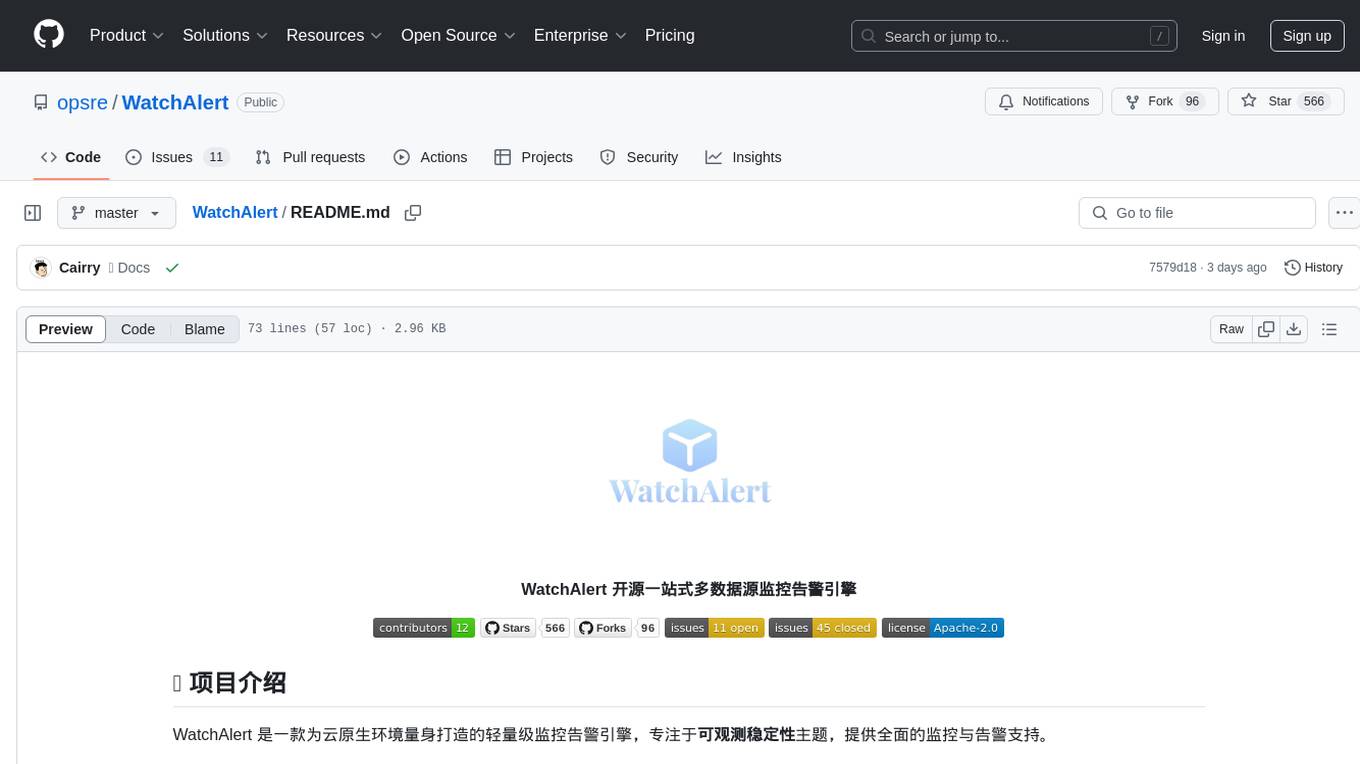
WatchAlert
WatchAlert is a lightweight monitoring and alerting engine tailored for cloud-native environments, focusing on observability and stability themes. It provides comprehensive monitoring and alerting support, including AI-powered alert analysis for efficient troubleshooting. WatchAlert integrates with various data sources such as Prometheus, VictoriaMetrics, Loki, Elasticsearch, AliCloud SLS, Jaeger, Kubernetes, and different network protocols for monitoring and supports alert notifications via multiple channels like Feishu, DingTalk, WeChat Work, email, and custom hooks. It is optimized for cloud-native environments, easy to use, offers flexible alert rule configurations, and specializes in stability scenarios to help users quickly identify and resolve issues, providing a reliable monitoring and alerting solution to enhance operational efficiency and reduce maintenance costs.
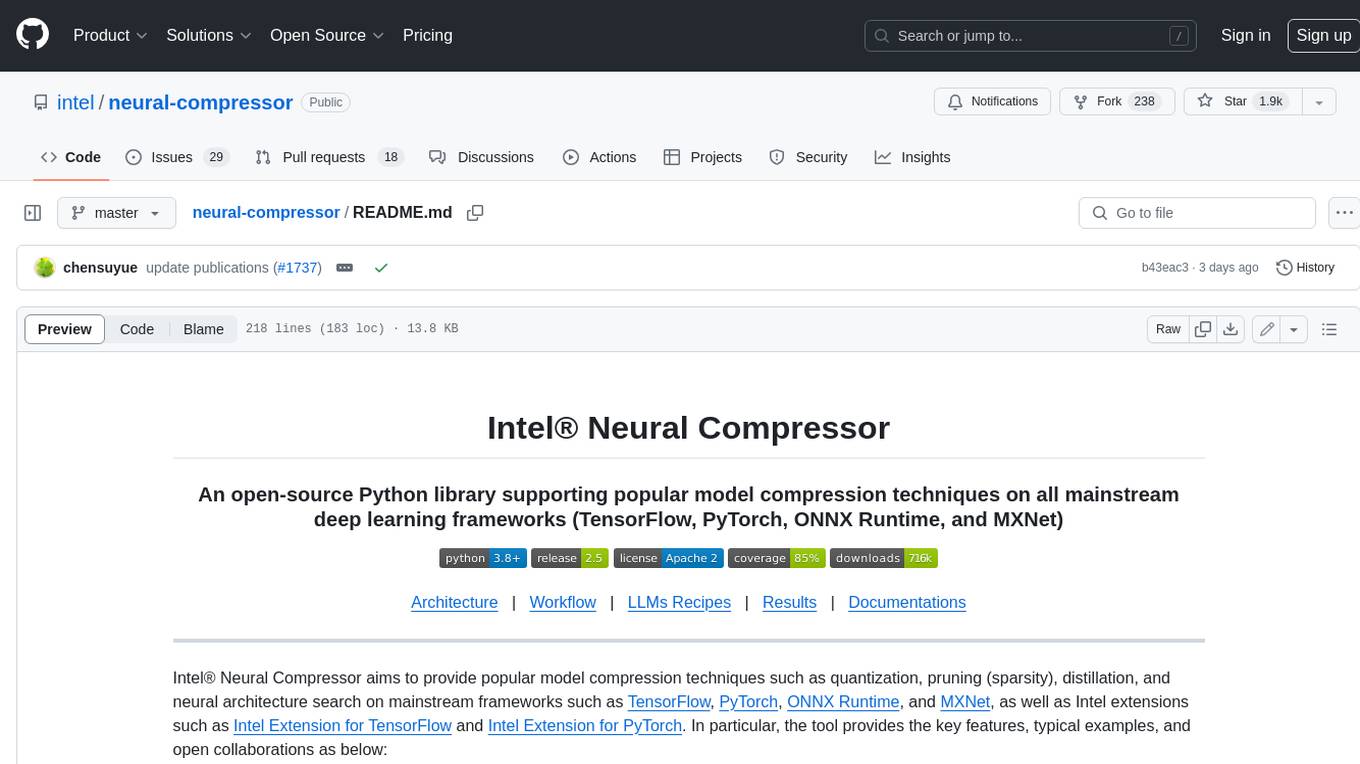
neural-compressor
Intel® Neural Compressor is an open-source Python library that supports popular model compression techniques such as quantization, pruning (sparsity), distillation, and neural architecture search on mainstream frameworks such as TensorFlow, PyTorch, ONNX Runtime, and MXNet. It provides key features, typical examples, and open collaborations, including support for a wide range of Intel hardware, validation of popular LLMs, and collaboration with cloud marketplaces, software platforms, and open AI ecosystems.
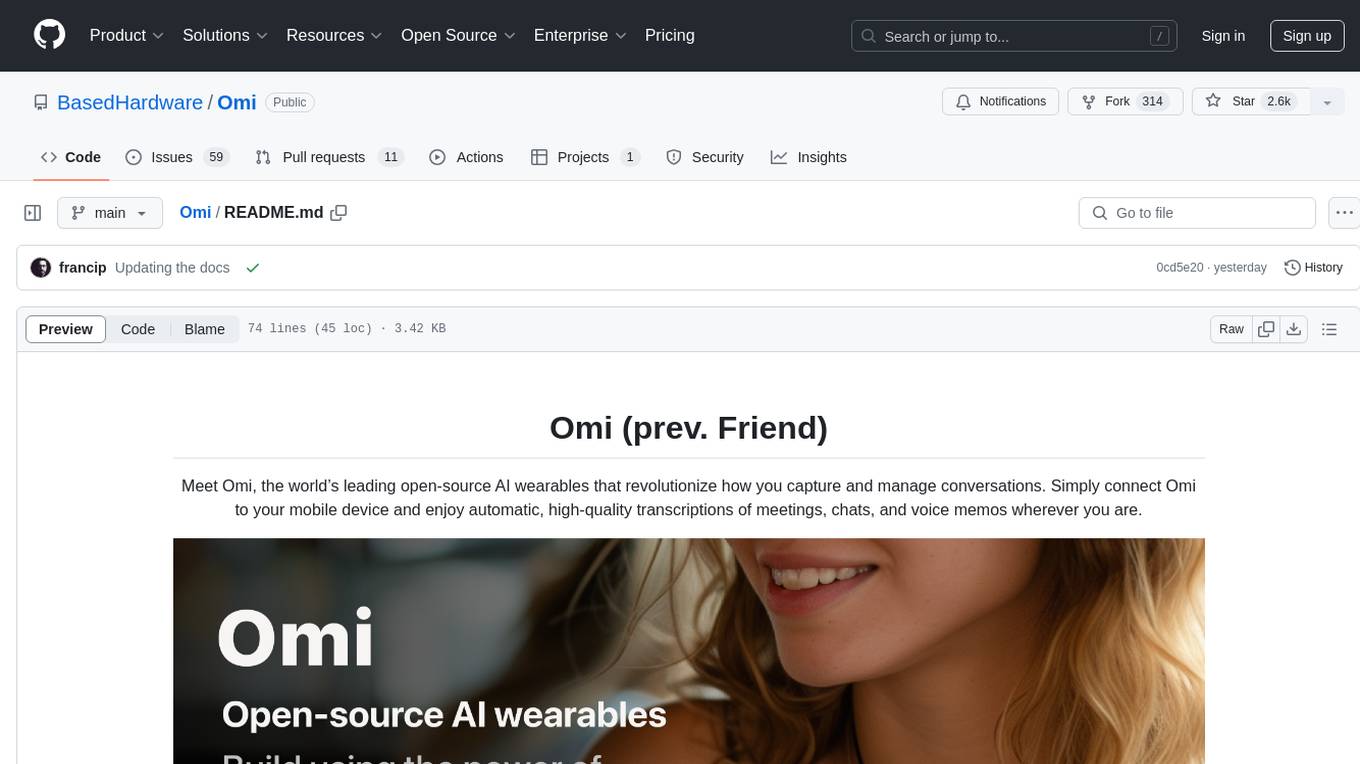
Omi
Omi is an open-source AI wearable that transforms the way conversations are captured and managed. By connecting Omi to your mobile device, you can effortlessly obtain high-quality transcriptions of meetings, chats, and voice memos on the go.
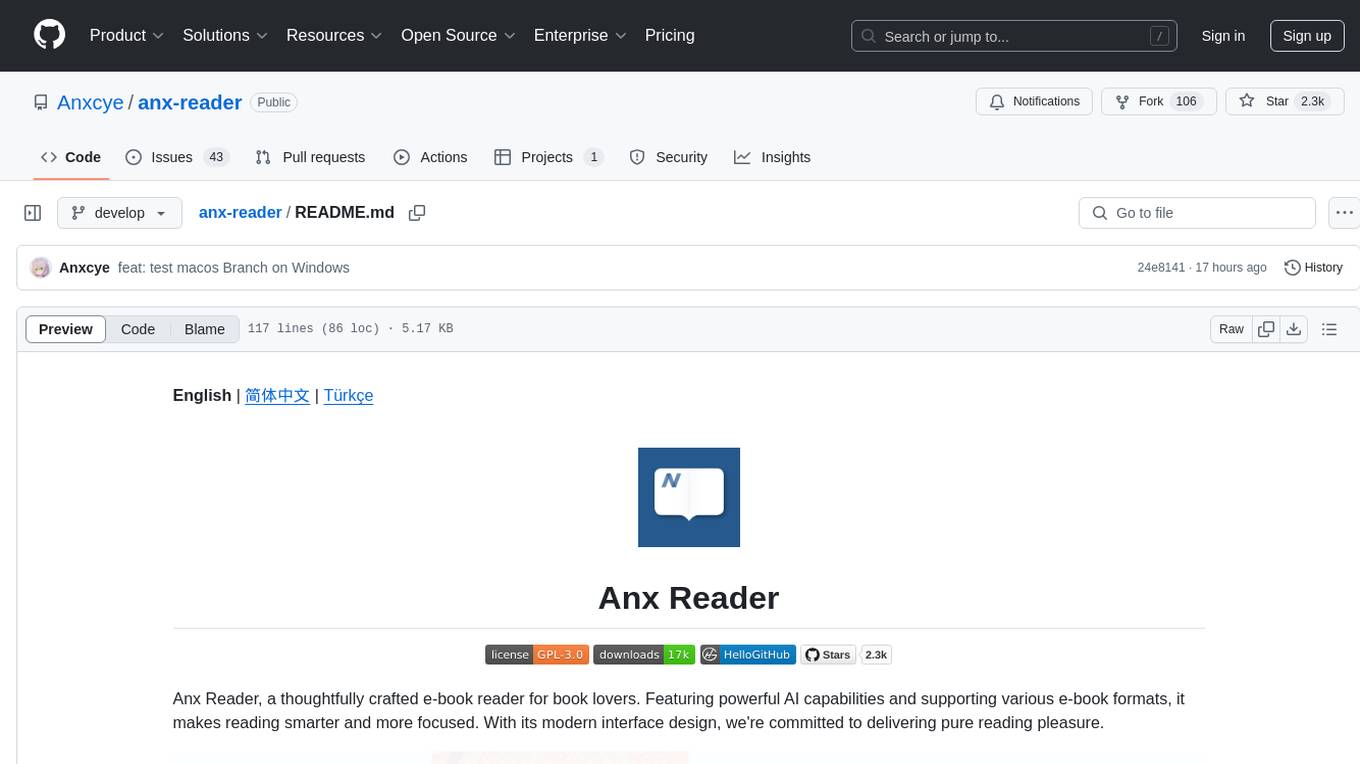
anx-reader
Anx Reader is a meticulously designed e-book reader tailored for book enthusiasts. It boasts powerful AI functionalities and supports various e-book formats, enhancing the reading experience. With a modern interface, the tool aims to provide a seamless and enjoyable reading journey. It offers rich format support, seamless sync across devices, smart AI assistance, personalized reading experiences, professional reading analytics, a powerful note system, practical tools, and cross-platform support. The tool is continuously evolving with features like UI adaptation for tablets, page-turning animation, TTS voice reading, reading fonts, translation, and more in the pipeline.
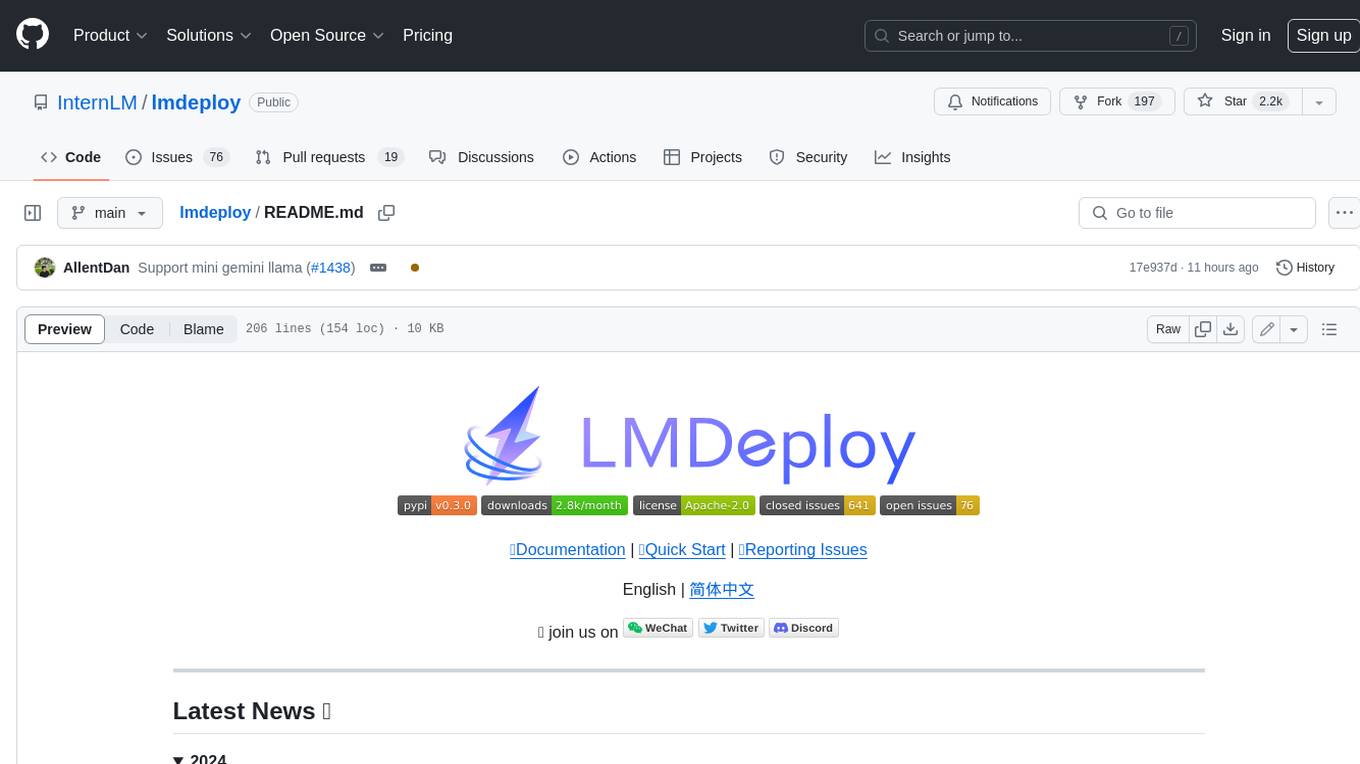
lmdeploy
LMDeploy is a toolkit for compressing, deploying, and serving LLM, developed by the MMRazor and MMDeploy teams. It has the following core features: * **Efficient Inference** : LMDeploy delivers up to 1.8x higher request throughput than vLLM, by introducing key features like persistent batch(a.k.a. continuous batching), blocked KV cache, dynamic split&fuse, tensor parallelism, high-performance CUDA kernels and so on. * **Effective Quantization** : LMDeploy supports weight-only and k/v quantization, and the 4-bit inference performance is 2.4x higher than FP16. The quantization quality has been confirmed via OpenCompass evaluation. * **Effortless Distribution Server** : Leveraging the request distribution service, LMDeploy facilitates an easy and efficient deployment of multi-model services across multiple machines and cards. * **Interactive Inference Mode** : By caching the k/v of attention during multi-round dialogue processes, the engine remembers dialogue history, thus avoiding repetitive processing of historical sessions.

tidb
TiDB is an open-source distributed SQL database that supports Hybrid Transactional and Analytical Processing (HTAP) workloads. It is MySQL compatible and features horizontal scalability, strong consistency, and high availability.
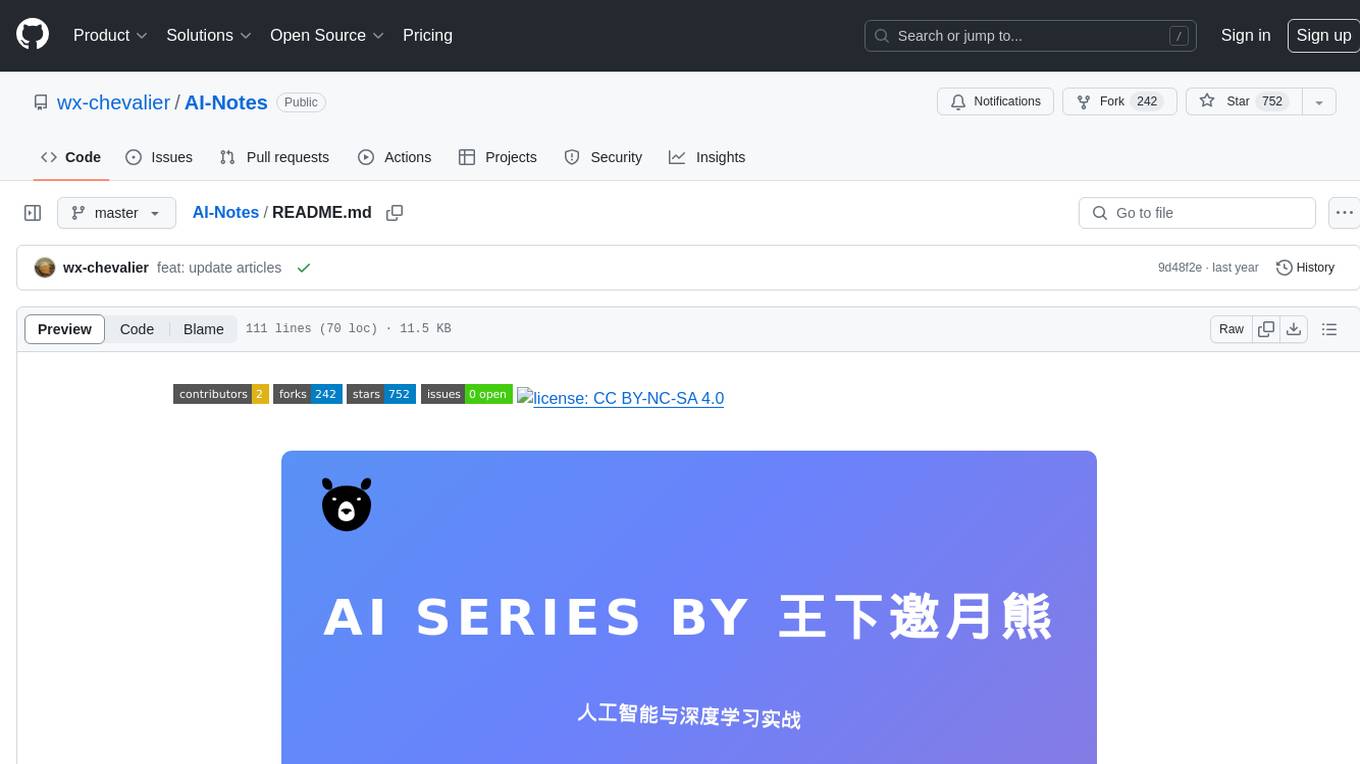
AI-Notes
AI-Notes is a repository dedicated to practical applications of artificial intelligence and deep learning. It covers concepts such as data mining, machine learning, natural language processing, and AI. The repository contains Jupyter Notebook examples for hands-on learning and experimentation. It explores the development stages of AI, from narrow artificial intelligence to general artificial intelligence and superintelligence. The content delves into machine learning algorithms, deep learning techniques, and the impact of AI on various industries like autonomous driving and healthcare. The repository aims to provide a comprehensive understanding of AI technologies and their real-world applications.
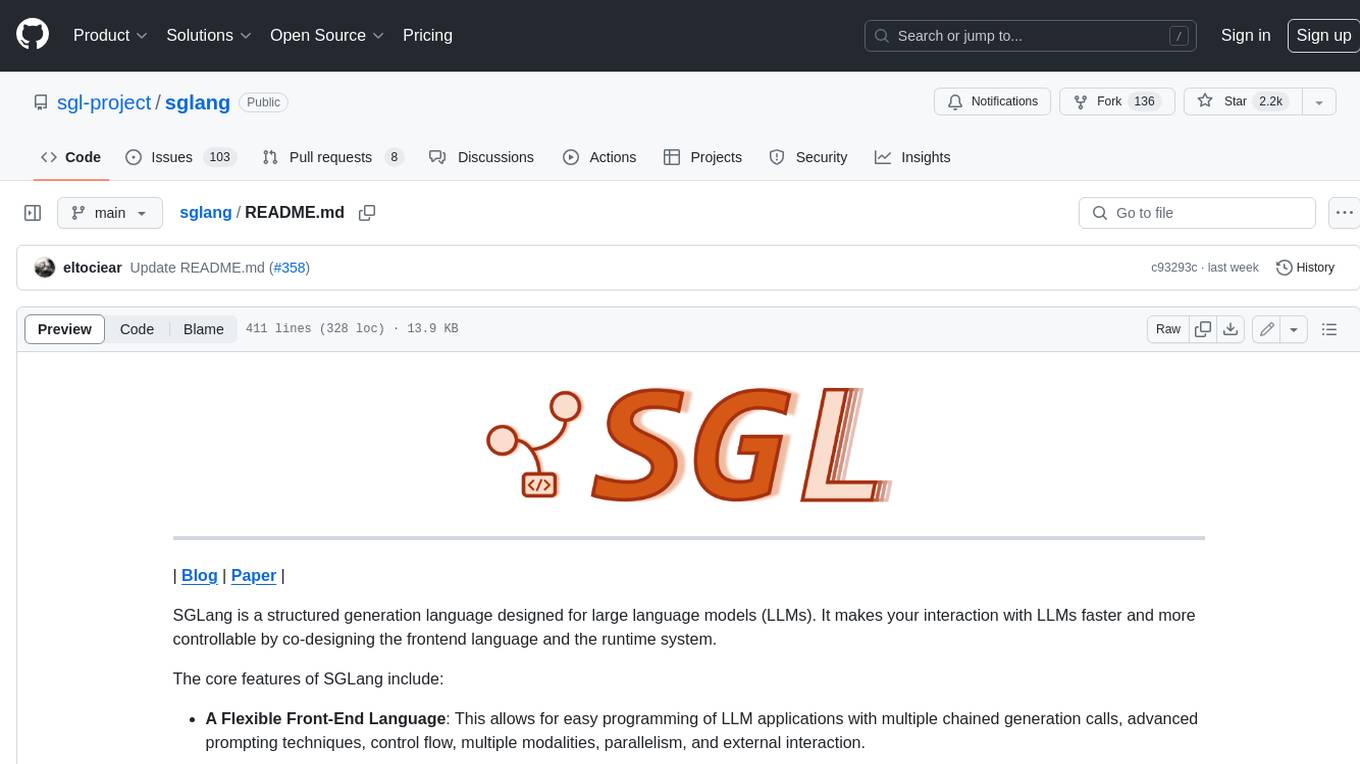
sglang
SGLang is a structured generation language designed for large language models (LLMs). It makes your interaction with LLMs faster and more controllable by co-designing the frontend language and the runtime system. The core features of SGLang include: - **A Flexible Front-End Language**: This allows for easy programming of LLM applications with multiple chained generation calls, advanced prompting techniques, control flow, multiple modalities, parallelism, and external interaction. - **A High-Performance Runtime with RadixAttention**: This feature significantly accelerates the execution of complex LLM programs by automatic KV cache reuse across multiple calls. It also supports other common techniques like continuous batching and tensor parallelism.
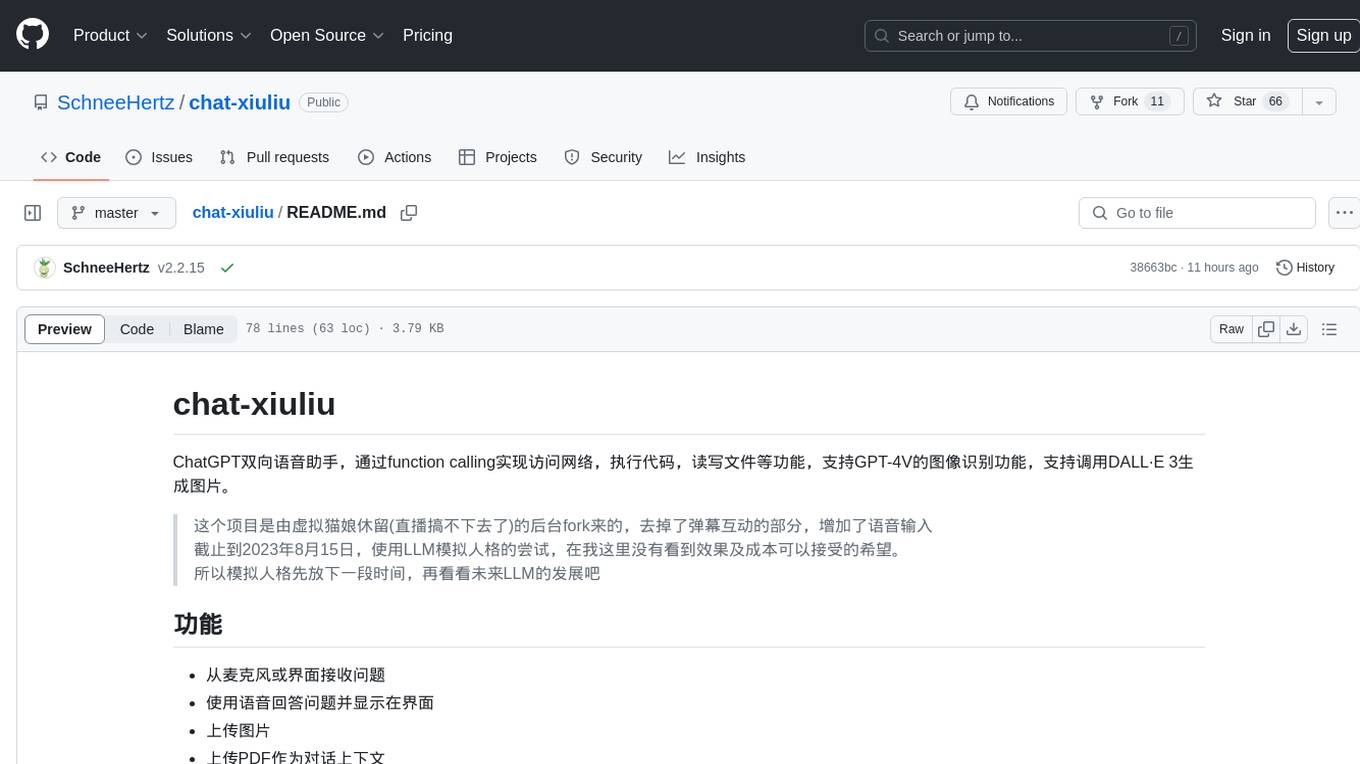
chat-xiuliu
Chat-xiuliu is a bidirectional voice assistant powered by ChatGPT, capable of accessing the internet, executing code, reading/writing files, and supporting GPT-4V's image recognition feature. It can also call DALL·E 3 to generate images. The project is a fork from a background of a virtual cat girl named Xiuliu, with removed live chat interaction and added voice input. It can receive questions from microphone or interface, answer them vocally, upload images and PDFs, process tasks through function calls, remember conversation content, search the web, generate images using DALL·E 3, read/write local files, execute JavaScript code in a sandbox, open local files or web pages, customize the cat girl's speaking style, save conversation screenshots, and support Azure OpenAI and other API endpoints in openai format. It also supports setting proxies and various AI models like GPT-4, GPT-3.5, and DALL·E 3.

postiz-app
Postiz is an ultimate AI social media scheduling tool that offers everything you need to manage your social media posts, build an audience, capture leads, and grow your business. It allows you to schedule posts with AI features, measure work with analytics, collaborate with team members, and invite others to comment and schedule posts. The tech stack includes NX (Monorepo), NextJS (React), NestJS, Prisma, Redis, and Resend for email notifications.
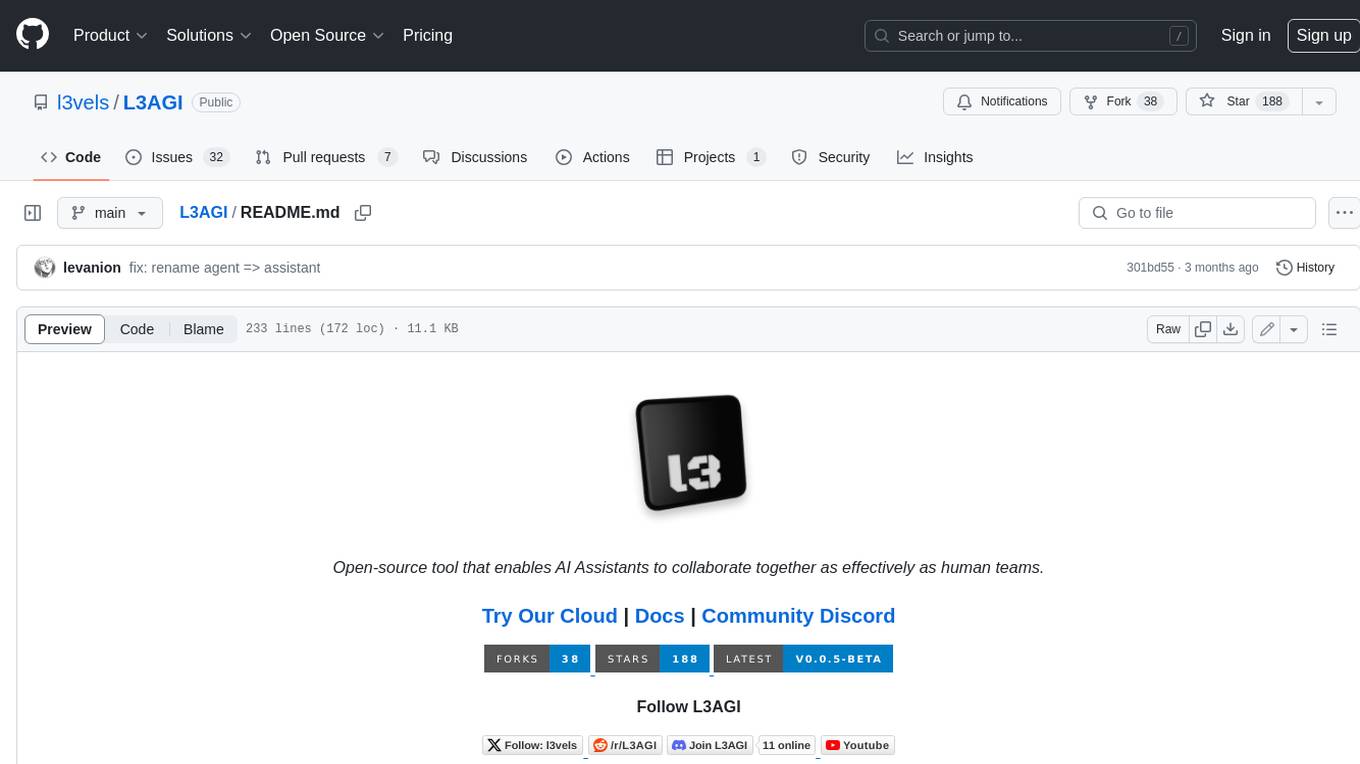
L3AGI
L3AGI is an open-source tool that enables AI Assistants to collaborate together as effectively as human teams. It provides a robust set of functionalities that empower users to design, supervise, and execute both autonomous AI Assistants and Teams of Assistants. Key features include the ability to create and manage Teams of AI Assistants, design and oversee standalone AI Assistants, equip AI Assistants with the ability to retain and recall information, connect AI Assistants to an array of data sources for efficient information retrieval and processing, and employ curated sets of tools for specific tasks. L3AGI also offers a user-friendly interface, APIs for integration with other systems, and a vibrant community for support and collaboration.
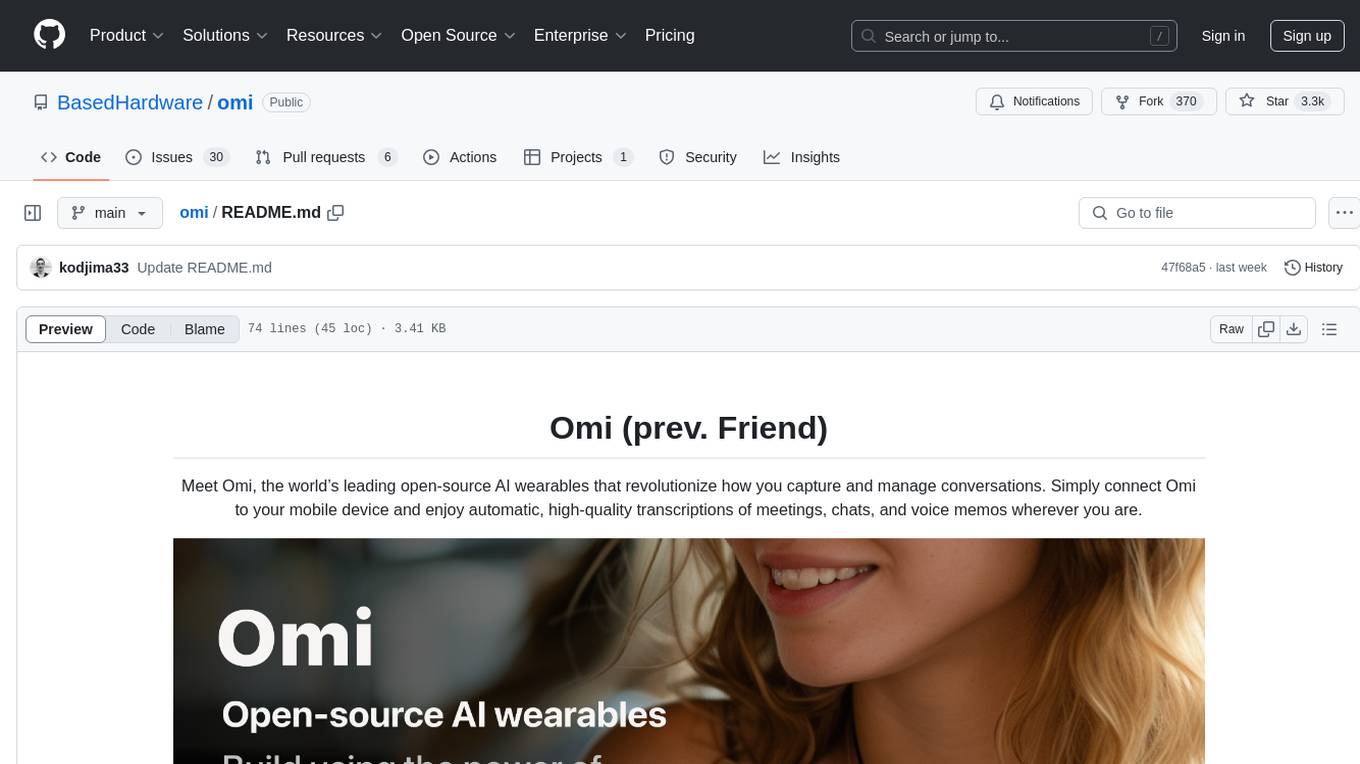
omi
Omi is an open-source AI wearable that provides automatic, high-quality transcriptions of meetings, chats, and voice memos. It revolutionizes how conversations are captured and managed by connecting to mobile devices. The tool offers features for seamless documentation and integration with third-party services.
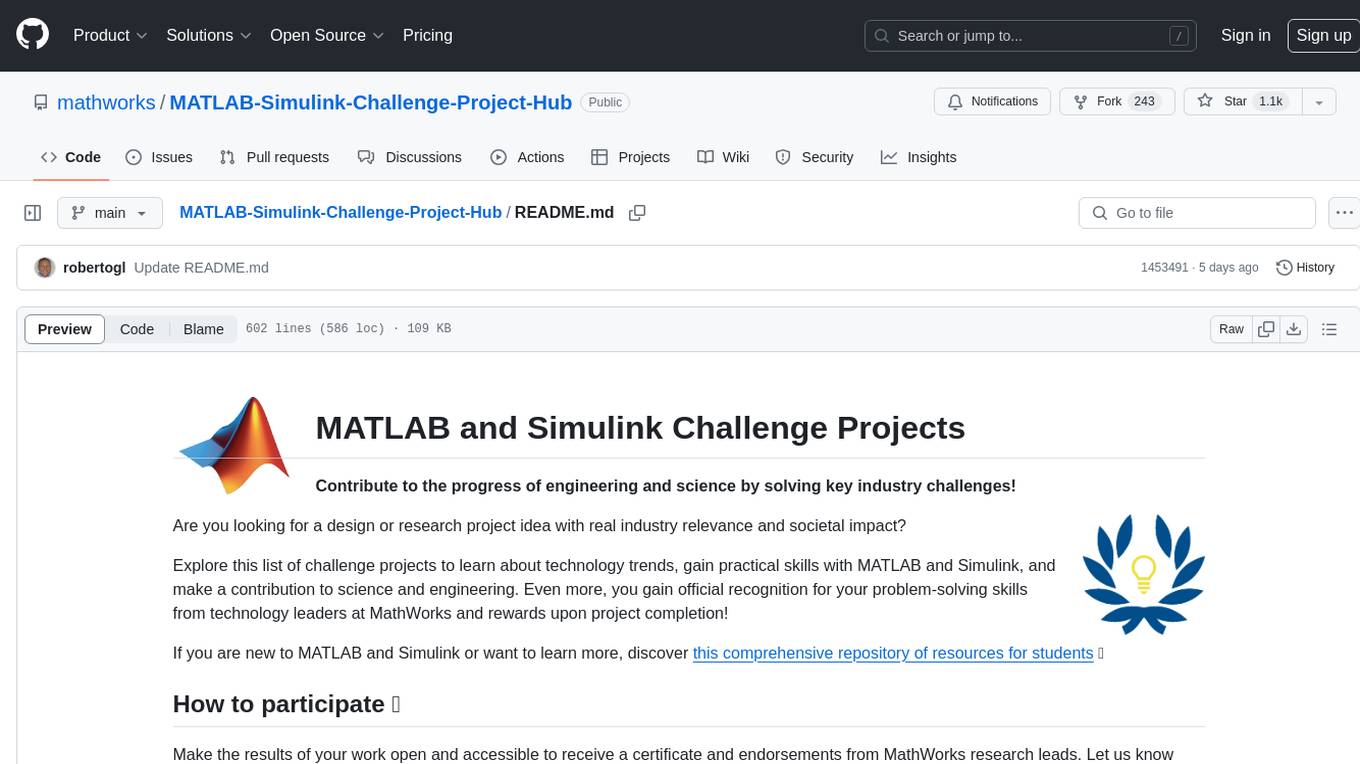
MATLAB-Simulink-Challenge-Project-Hub
MATLAB-Simulink-Challenge-Project-Hub is a repository aimed at contributing to the progress of engineering and science by providing challenge projects with real industry relevance and societal impact. The repository offers a wide range of projects covering various technology trends such as Artificial Intelligence, Autonomous Vehicles, Big Data, Computer Vision, and Sustainability. Participants can gain practical skills with MATLAB and Simulink while making a significant contribution to science and engineering. The projects are designed to enhance expertise in areas like Sustainability and Renewable Energy, Control, Modeling and Simulation, Machine Learning, and Robotics. By participating in these projects, individuals can receive official recognition for their problem-solving skills from technology leaders at MathWorks and earn rewards upon project completion.

awesome-langchain
LangChain is an amazing framework to get LLM projects done in a matter of no time, and the ecosystem is growing fast. Here is an attempt to keep track of the initiatives around LangChain. Subscribe to the newsletter to stay informed about the Awesome LangChain. We send a couple of emails per month about the articles, videos, projects, and tools that grabbed our attention Contributions welcome. Add links through pull requests or create an issue to start a discussion. Please read the contribution guidelines before contributing.
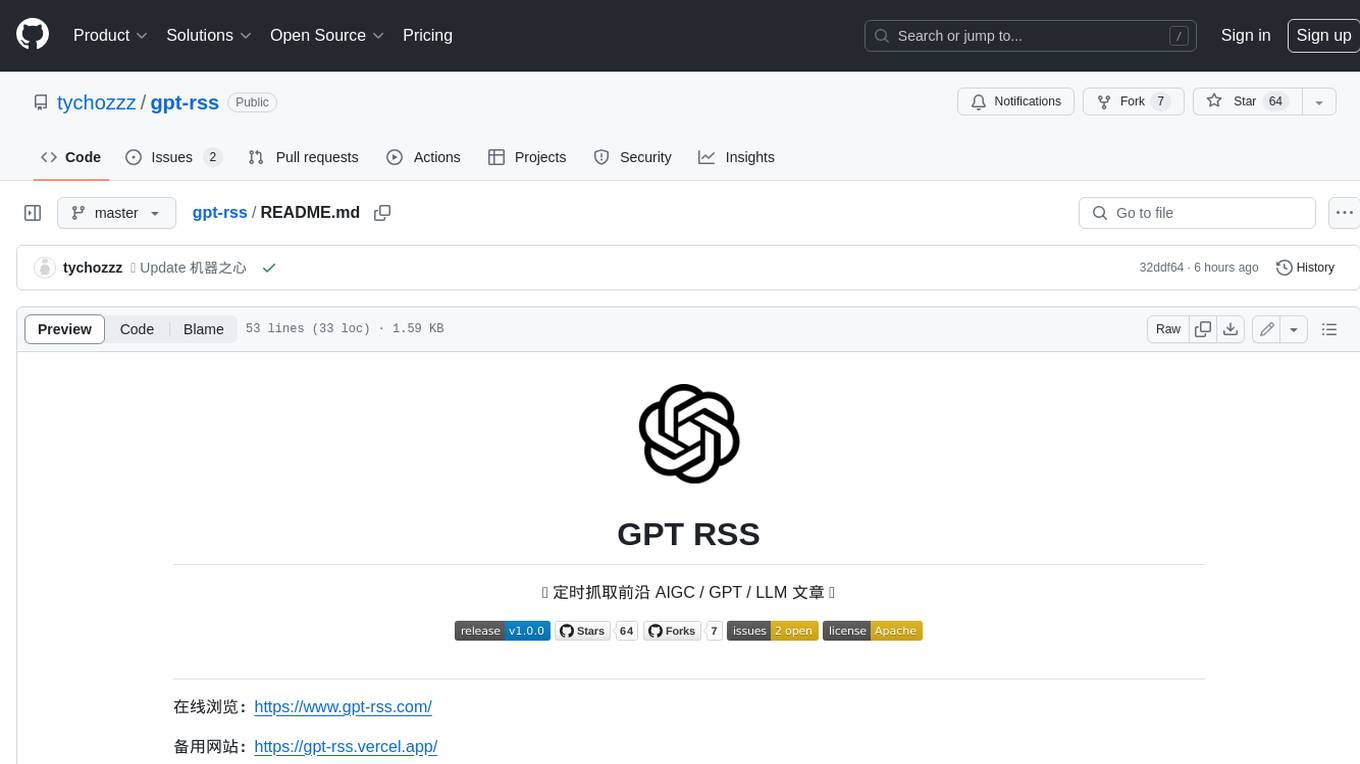
gpt-rss
GPT RSS is a tool that allows users to stay up-to-date on the latest AIGC/GPT/LLM articles by定时抓取前沿 AIGC / GPT / LLM 文章. It features a user-friendly interface that supports PC and mobile devices, as well as search and filter functions. GPT RSS is built using Vue3 and Vant UI component library, and utilizes Node.js for定时任务 to update articles daily.
For similar tasks

book
Podwise is an AI knowledge management app designed specifically for podcast listeners. With the Podwise platform, you only need to follow your favorite podcasts, such as "Hardcore Hackers". When a program is released, Podwise will use AI to transcribe, extract, summarize, and analyze the podcast content, helping you to break down the hard-core podcast knowledge. At the same time, it is connected to platforms such as Notion, Obsidian, Logseq, and Readwise, embedded in your knowledge management workflow, and integrated with content from other channels including news, newsletters, and blogs, helping you to improve your second brain 🧠.
For similar jobs

book
Podwise is an AI knowledge management app designed specifically for podcast listeners. With the Podwise platform, you only need to follow your favorite podcasts, such as "Hardcore Hackers". When a program is released, Podwise will use AI to transcribe, extract, summarize, and analyze the podcast content, helping you to break down the hard-core podcast knowledge. At the same time, it is connected to platforms such as Notion, Obsidian, Logseq, and Readwise, embedded in your knowledge management workflow, and integrated with content from other channels including news, newsletters, and blogs, helping you to improve your second brain 🧠.
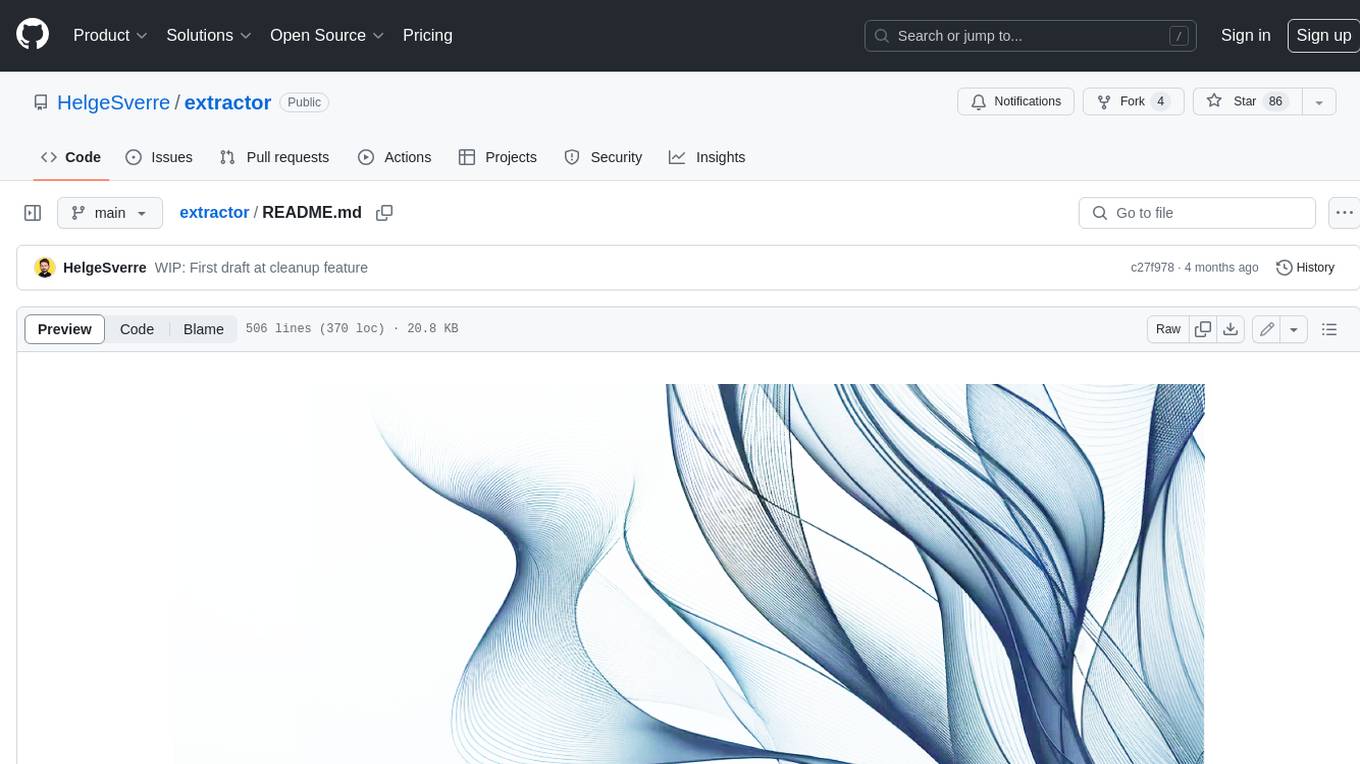
extractor
Extractor is an AI-powered data extraction library for Laravel that leverages OpenAI's capabilities to effortlessly extract structured data from various sources, including images, PDFs, and emails. It features a convenient wrapper around OpenAI Chat and Completion endpoints, supports multiple input formats, includes a flexible Field Extractor for arbitrary data extraction, and integrates with Textract for OCR functionality. Extractor utilizes JSON Mode from the latest GPT-3.5 and GPT-4 models, providing accurate and efficient data extraction.
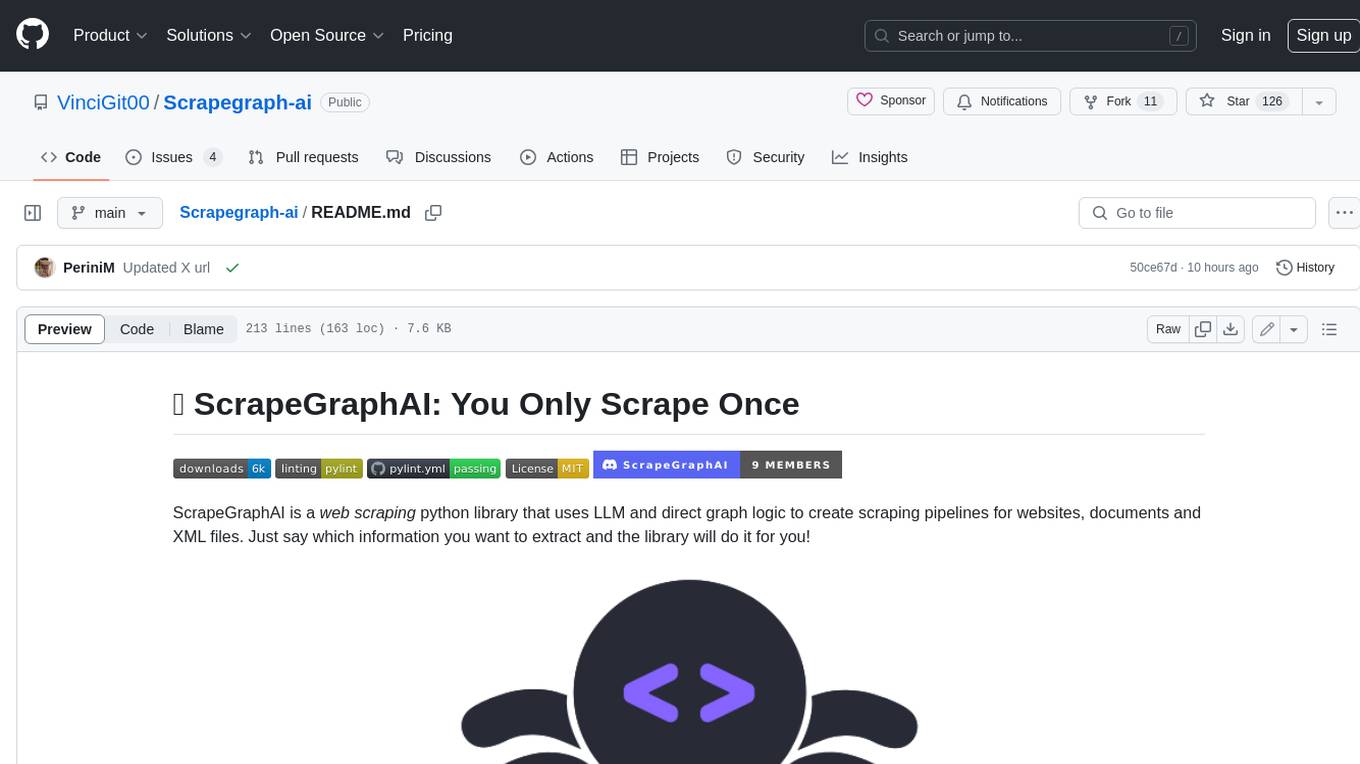
Scrapegraph-ai
ScrapeGraphAI is a Python library that uses Large Language Models (LLMs) and direct graph logic to create web scraping pipelines for websites, documents, and XML files. It allows users to extract specific information from web pages by providing a prompt describing the desired data. ScrapeGraphAI supports various LLMs, including Ollama, OpenAI, Gemini, and Docker, enabling users to choose the most suitable model for their needs. The library provides a user-friendly interface through its `SmartScraper` class, which simplifies the process of building and executing scraping pipelines. ScrapeGraphAI is open-source and available on GitHub, with extensive documentation and examples to guide users. It is particularly useful for researchers and data scientists who need to extract structured data from web pages for analysis and exploration.

databerry
Chaindesk is a no-code platform that allows users to easily set up a semantic search system for personal data without technical knowledge. It supports loading data from various sources such as raw text, web pages, files (Word, Excel, PowerPoint, PDF, Markdown, Plain Text), and upcoming support for web sites, Notion, and Airtable. The platform offers a user-friendly interface for managing datastores, querying data via a secure API endpoint, and auto-generating ChatGPT Plugins for each datastore. Chaindesk utilizes a Vector Database (Qdrant), Openai's text-embedding-ada-002 for embeddings, and has a chunk size of 1024 tokens. The technology stack includes Next.js, Joy UI, LangchainJS, PostgreSQL, Prisma, and Qdrant, inspired by the ChatGPT Retrieval Plugin.

auto-news
Auto-News is an automatic news aggregator tool that utilizes Large Language Models (LLM) to pull information from various sources such as Tweets, RSS feeds, YouTube videos, web articles, Reddit, and journal notes. The tool aims to help users efficiently read and filter content based on personal interests, providing a unified reading experience and organizing information effectively. It features feed aggregation with summarization, transcript generation for videos and articles, noise reduction, task organization, and deep dive topic exploration. The tool supports multiple LLM backends, offers weekly top-k aggregations, and can be deployed on Linux/MacOS using docker-compose or Kubernetes.
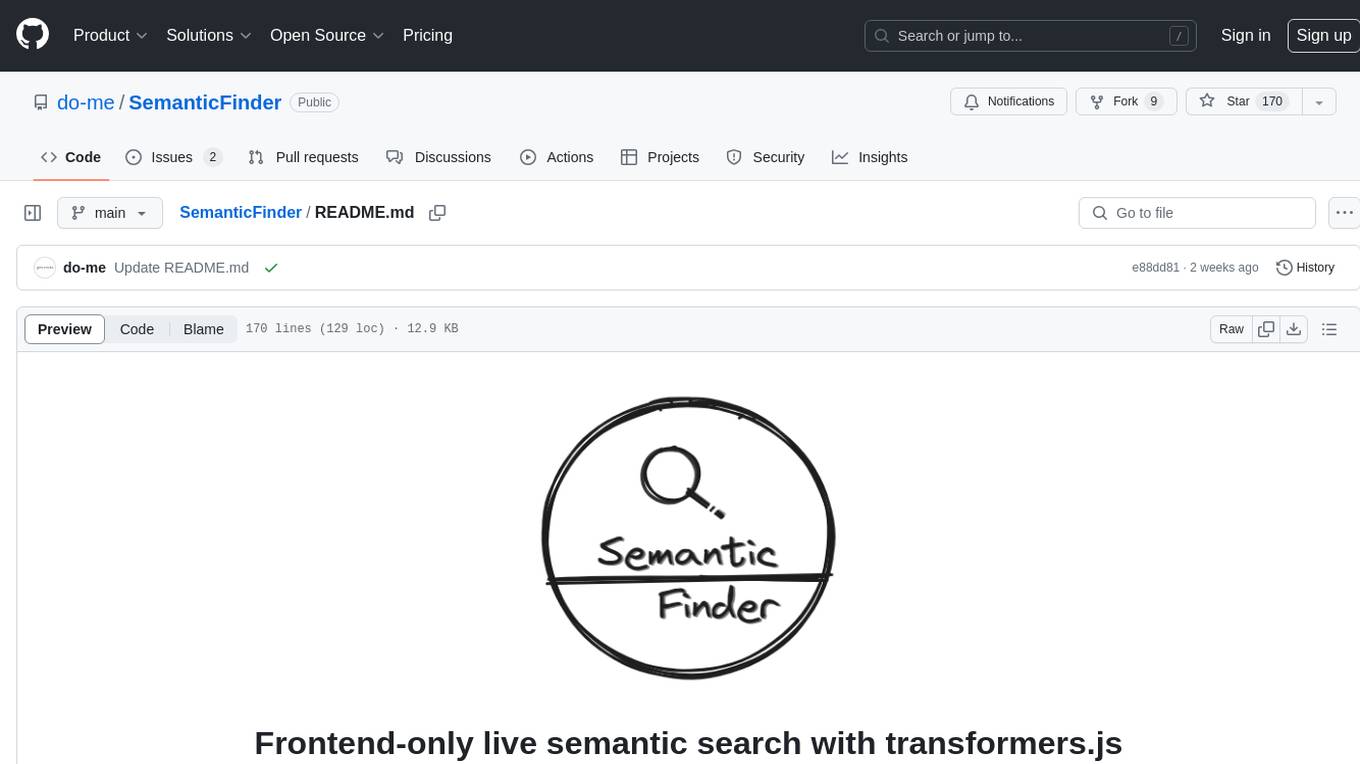
SemanticFinder
SemanticFinder is a frontend-only live semantic search tool that calculates embeddings and cosine similarity client-side using transformers.js and SOTA embedding models from Huggingface. It allows users to search through large texts like books with pre-indexed examples, customize search parameters, and offers data privacy by keeping input text in the browser. The tool can be used for basic search tasks, analyzing texts for recurring themes, and has potential integrations with various applications like wikis, chat apps, and personal history search. It also provides options for building browser extensions and future ideas for further enhancements and integrations.

1filellm
1filellm is a command-line data aggregation tool designed for LLM ingestion. It aggregates and preprocesses data from various sources into a single text file, facilitating the creation of information-dense prompts for large language models. The tool supports automatic source type detection, handling of multiple file formats, web crawling functionality, integration with Sci-Hub for research paper downloads, text preprocessing, and token count reporting. Users can input local files, directories, GitHub repositories, pull requests, issues, ArXiv papers, YouTube transcripts, web pages, Sci-Hub papers via DOI or PMID. The tool provides uncompressed and compressed text outputs, with the uncompressed text automatically copied to the clipboard for easy pasting into LLMs.
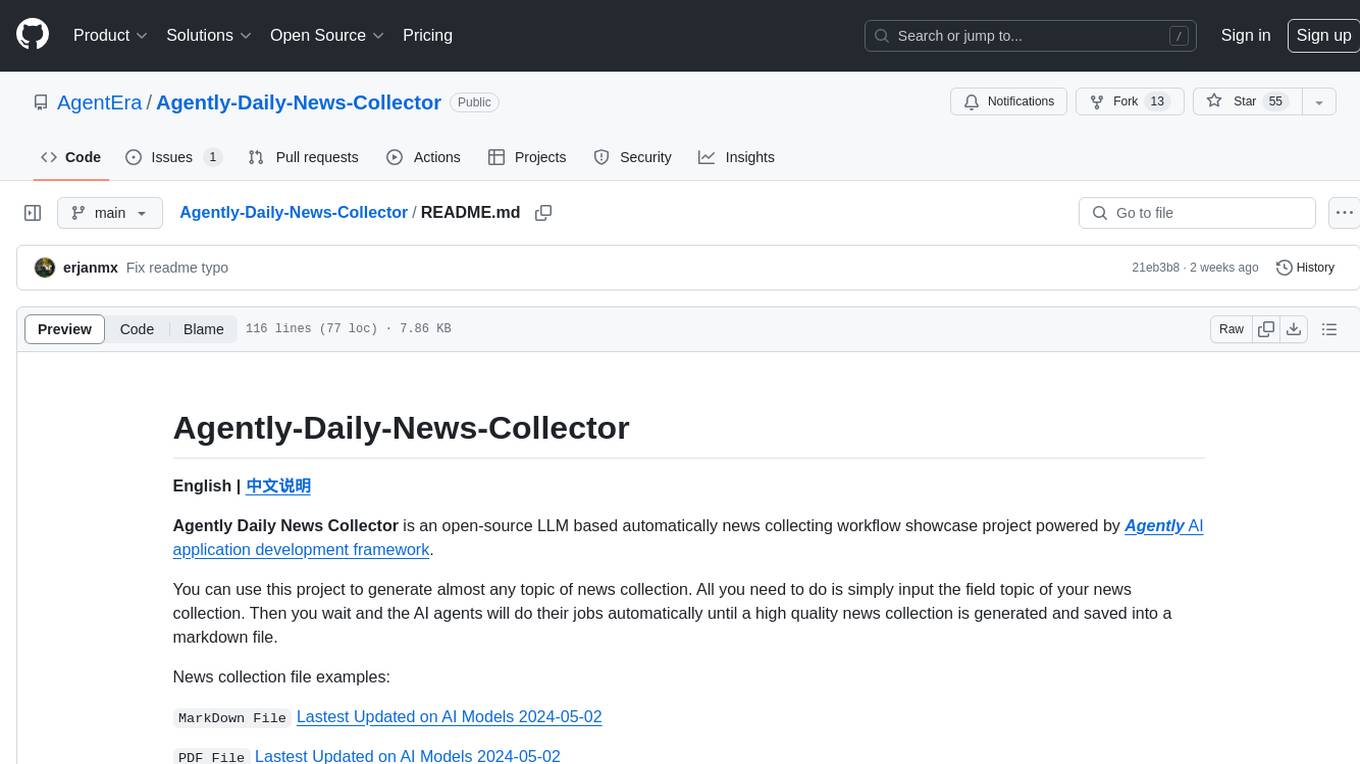
Agently-Daily-News-Collector
Agently Daily News Collector is an open-source project showcasing a workflow powered by the Agent ly AI application development framework. It allows users to generate news collections on various topics by inputting the field topic. The AI agents automatically perform the necessary tasks to generate a high-quality news collection saved in a markdown file. Users can edit settings in the YAML file, install Python and required packages, input their topic idea, and wait for the news collection to be generated. The process involves tasks like outlining, searching, summarizing, and preparing column data. The project dependencies include Agently AI Development Framework, duckduckgo-search, BeautifulSoup4, and PyYAM.



